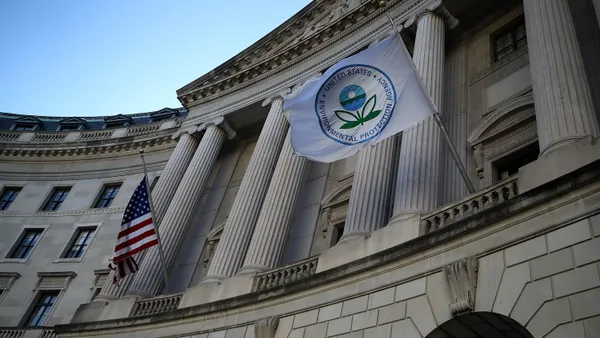In the Daily Digest, the Waste Dive team rounds up insights and moments you may have missed.
CONTAMINATION QUESTIONS IN CHICAGO
Last week, a new report was published about recycling collection in Chicago that has touched on sensitive nerves, both locally and nationally.
The Better Government Association, which describes itself as "Illinois’ only non-partisan, full-service watchdog organization," has called out Waste Management for marking recycling carts as contaminated far more often than other municipal or private collection crews. Specifically, the company is contracted to collect about half of Chicago's residential accounts and is responsible for 90% of the carts being tagged for disposal citywide.
Chicago's recycling challenges are years in the making, as chronicled in the BGA's piece, and contamination has long been an issue even before China's policy announcements upended market standards last year. Waste Management has played a key role in that history, and BGA effectively takes the stance that the company is hindering progress in the name of profit. The company has of course disputed these claims, as illustrated in a months-long email exchange published with the piece, and says this is no different than what it's currently doing around contamination nationwide.
Waste Management's decreasing tolerance for contamination — and the financial losses it can cause — are well-documented at this point across numerous earnings calls, interviews and other local stories. Whether that's now being used intentionally as a way to direct tonnage to the company's local landfill is a question worth asking, and would be problematic if proven true. Though the story also raises further questions that may be equally relevant to Chicago's long-term future going forward.
- Why does Lakeshore Recycling, the other private contractor receiving Chicago's recyclables at its MRF, report having less difficulty with contamination? What specifically is different about the respective companies' MRF processes and how will those capabilities be addressed in future RFPs?
- Which neighborhoods in the city have traditionally had higher contamination rates? Are they part of Waste Management's service area?
- Why doesn't Chicago's Department of Streets and Sanitation have standard procedures in place for reviewing how often carts are being tagged as contaminated? What is the city's long-term plan for investing in education beyond smaller pilots?
In order to fully address these endemic quality issues — in what is widely regarded as one of the most challenged big city recycling programs in the country — it will be important to not only hold contractors accountable but also look at the underlying system they're operating within.
IN OTHER NEWS
Casella gets state approval to expand Vermont's last, and largest, landfill - Waste Dive
NERC survey finds 38% of Northeast MRF glass going to landfills - Waste Dive
Kentucky collection workers cry foul over wage disparities — Lexington Herald-Leader
Despite city intervention to address the issue in 2015, some collection workers in Lexington, Kentucky say their wages still don't reflect seniority and experience. Multiple reports have come in about newer workers earning more than their seasoned counterparts. One factor may be the American Federation of State, County and Municipal Employees, which represents collection workers, doesn't have the same full union status as those representing police officers, firefighters or others. Because of this, the union isn't technically allowed to discuss wage increases during meetings with city officials. The Lexington-Fayette Urban County Council is now considering a potential step increase system to reconcile this issue.
2 workers rescued from within Wheelabrator boiler in Massachusetts — MassLive & NECN
Emergency crews were called to the Wheelabrator Millbury waste-to-energy facility over the weekend after two workers were trapped inside a boiler for more than two hours. A harness cable malfunctioned during a monthly cleaning, leaving them stuck about 30 feet down inside a 70-foot boiler. The workers were able to secure themselves in place until help arrived and sustained no injuries.
Missouri city ditching single-stream, dropping paper — KMOV
O'Fallon, Missouri, a city of more than 86,000 people, will be cutting back its standard single-stream collection program. Starting Oct. 29, residents will only be able to recycle glass, aluminum, tin and plastics (with the exception of #4 and #7). No paper products of any kind will be accepted. This is due to the recent announcement by MRF operator Resource Management that it would stop taking single-stream material in November. The move has left multiple municipalities scrambling for solutions. Neighboring Kirkwood initially announced it would suspend all collection, but has since walked that back. Some have looked to Republic Services, but O'Fallon decided the costs to continue single-stream with the company would be too high.
TRASH WORLD
Japan setting new plastic targets after sitting out G7 charter — The Japan Times
The Japanese government is expected to announce a new plan to reduce disposable plastic waste 25% and increase the use of bio-based plastics significantly by 2030. The plan also calls for increasing the proportion of recycled or reused plastic to 60% of all waste — up from 53% in 2016. Other initiatives will include reuse targets for electronics and automobile parts, mandatory charges for shopping bags and a ban on microplastics in certain personal care products. If adopted, this will mark an even more aggressive plastic commitment than the one Japan and the U.S. refused to sign on to at the G7 meeting in Canada earlier this year.
SEEN & HEARD
50 million tonnes of #ewaste will be generated globally in 2018. 80% of this will go to landfill, be burned or illegally traded. Remember to #recycle for our planet, health and #economy! #ewasteday https://t.co/ZXKRYtoTg2 pic.twitter.com/Fl5FIxnCZC
— UNEnvironment Europe (@UNEnvironmentEu) October 13, 2018
Do you have events or webinars that should be on our agenda this week? Email waste.dive.editors@industrydive.com.










